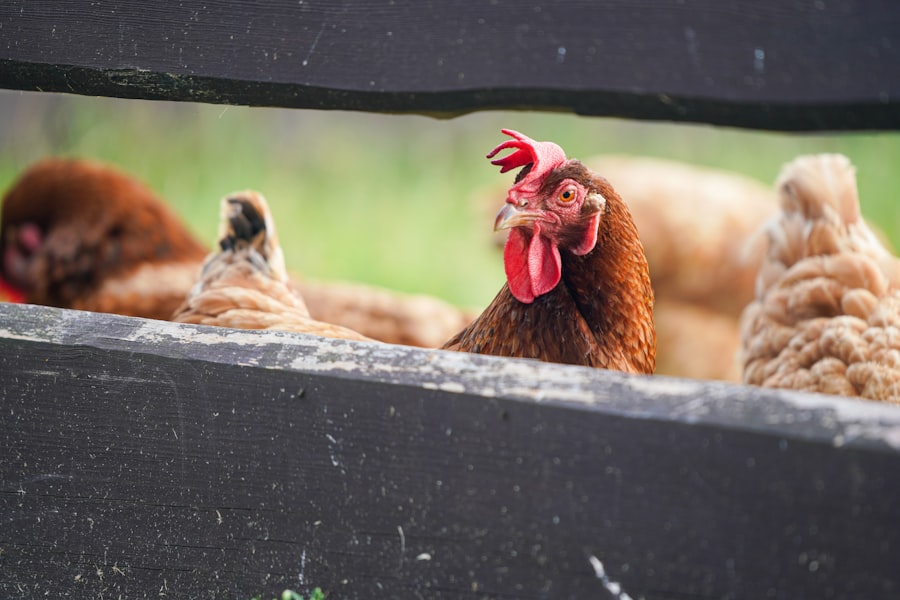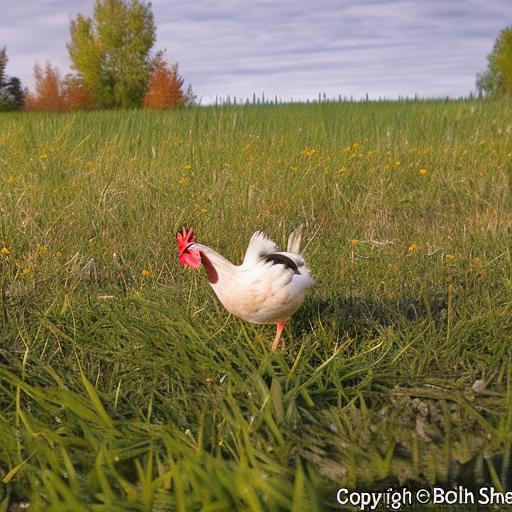Urban chicken keeping has become increasingly popular in recent years, as more and more people are discovering the joys and benefits of raising chickens in the city. While the practice of keeping chickens in urban areas may seem like a new trend, it actually has a long history. In the early 20th century, many families in cities across North America kept chickens in their backyards as a way to supplement their food supply during times of economic hardship. However, as cities became more developed and industrialized, the practice of urban chicken keeping fell out of favor.
In recent years, there has been a resurgence of interest in urban chicken keeping. People are drawn to the idea of having fresh eggs right in their own backyard, as well as the opportunity to connect with nature and live a more sustainable lifestyle. Additionally, raising chickens can be a fun and educational experience for both children and adults alike. It teaches responsibility, patience, and provides an opportunity to learn about the natural world.
Key Takeaways
- Urban chicken keeping is becoming increasingly popular in cities like Winnipeg.
- It is important to understand local bylaws and regulations before starting a backyard flock.
- Building a safe and comfortable coop is essential for the health and well-being of your chickens.
- Providing a balanced diet and preventing common health issues can help maximize egg production.
- Protecting your flock from predators and pests is crucial, especially in Winnipeg’s cold climate.
Legal Considerations: Understanding Winnipeg’s Bylaws on Raising Chickens
Before embarking on the journey of raising chickens in Winnipeg, it is important to familiarize yourself with the city’s bylaws regarding urban chicken keeping. Currently, Winnipeg allows residents to keep up to six hens (no roosters) on their property, as long as they obtain a permit from the city. The permit can be obtained by filling out an application form and paying a small fee.
It is important to note that failure to follow Winnipeg’s bylaws on urban chicken keeping can result in consequences such as fines or having your chickens confiscated. Therefore, it is crucial to understand and abide by these regulations to ensure a positive experience for both you and your chickens.
Housing Requirements: Building a Safe and Comfortable Coop for Your Chickens
One of the most important aspects of raising chickens in the city is providing them with a safe and comfortable living environment. There are various types of coops to choose from, including stationary coops, mobile coops, and chicken tractors. The type of coop you choose will depend on factors such as the size of your backyard and the number of chickens you plan to keep.
When building a coop, it is important to use materials that are sturdy and predator-proof. The coop should have proper ventilation to prevent moisture buildup and should be insulated to keep the chickens warm during the winter months. Additionally, it is important to provide nesting boxes for the hens to lay their eggs and roosting bars for them to perch on at night.
Feeding and Nutrition: Providing a Balanced Diet for Your Flock
Proper nutrition is essential for the health and well-being of your chickens. There are various types of feed available on the market, including pellets, crumbles, and mash. It is important to choose a feed that is specifically formulated for laying hens, as it contains the necessary nutrients to support egg production.
In addition to commercial feed, it is also important to provide your chickens with fresh water and access to grit, which helps them digest their food. It is also beneficial to supplement their diet with kitchen scraps and garden waste, as this provides them with additional nutrients and helps reduce food waste.
When it comes to treats, it is important to give them in moderation. Some treats that are safe for chickens include fruits, vegetables, and mealworms. However, there are certain foods that should be avoided, such as chocolate, caffeine, onions, and avocado.
Health and Wellness: Common Health Issues and How to Prevent Them
Just like any other animal, chickens can be susceptible to various health issues. Some common health issues that chickens may experience include respiratory infections, parasites, and egg-laying problems.
To prevent these health issues, it is important to provide your chickens with a clean and sanitary living environment. This includes regularly cleaning their coop, providing fresh bedding, and ensuring that their food and water are clean. It is also important to practice good biosecurity measures, such as washing your hands before and after handling your chickens and not allowing visitors to enter the coop.
If you notice any signs of illness in your chickens, such as coughing, sneezing, or a decrease in egg production, it is important to seek veterinary care as soon as possible. Early detection and treatment can help prevent the spread of disease and improve the chances of a full recovery.
Egg Production: Maximizing Your Chickens’ Laying Potential

One of the main reasons why people choose to raise chickens in the city is for the fresh eggs. There are several factors that can affect egg production, including breed, age, diet, and environmental conditions.
To maximize egg production, it is important to choose breeds that are known for their high egg-laying capabilities, such as Rhode Island Reds or Leghorns. It is also important to provide your chickens with a balanced diet that is high in protein and calcium, as these nutrients are essential for egg production.
In addition to diet, it is important to provide your chickens with a comfortable and stress-free environment. This includes ensuring that they have enough space in their coop, providing them with proper lighting, and minimizing disturbances.
When it comes to collecting and storing eggs, it is important to handle them with care to prevent cracking or contamination. Eggs should be collected daily and stored in a cool place away from direct sunlight. It is also important to wash your hands before and after handling eggs to prevent the spread of bacteria.
Winter Care: Preparing Your Chickens for Winnipeg’s Cold Climate
Winnipeg’s cold winters can be challenging for chickens, but with proper care and preparation, they can thrive even in sub-zero temperatures. To prepare your chickens for winter, it is important to ensure that their coop is well-insulated and draft-free. This can be achieved by adding extra insulation to the walls and roof of the coop and sealing any gaps or cracks.
It is also important to provide your chickens with a heat source, such as a heat lamp or a heated waterer, to keep them warm during the coldest months. However, it is important to use caution when using heat sources in the coop, as they can be a fire hazard. It is recommended to use a thermostatically controlled heat source and to monitor the temperature regularly.
To prevent frostbite, it is important to keep the coop clean and dry. Moisture can lead to frostbite, so it is important to remove any wet bedding or droppings from the coop regularly. Additionally, it is important to provide your chickens with plenty of fresh water, as dehydration can increase their susceptibility to frostbite.
Predators and Pests: Protecting Your Flock from Common Threats
Predators and pests can pose a threat to your chickens, so it is important to take measures to protect them. Common predators include raccoons, foxes, coyotes, and neighborhood dogs. To protect your chickens from these predators, it is important to secure their coop with sturdy fencing and locks. It is also important to provide them with a secure run where they can safely roam during the day.
In addition to predators, chickens can also be susceptible to pests such as mites, lice, and rodents. To prevent infestations, it is important to regularly inspect your chickens for signs of pests and treat them accordingly. It is also important to keep their coop clean and free of debris, as this can attract pests.
Signs of an attack by a predator or pest include missing or injured chickens, feathers scattered around the coop or run, and signs of digging or burrowing near the coop. If you suspect that your chickens have been attacked, it is important to take immediate action to protect the rest of your flock.
Community Engagement: Connecting with Other Urban Chicken Keepers in Winnipeg
One of the benefits of raising chickens in the city is the opportunity to connect with other like-minded individuals. Joining a community of urban chicken keepers can provide support, advice, and a sense of camaraderie. There are several ways to connect with other urban chicken keepers in Winnipeg.
One way to connect with other urban chicken keepers is through online forums and social media groups. These platforms allow you to ask questions, share experiences, and learn from others who have been raising chickens in the city for longer.
Another way to connect with other urban chicken keepers is by attending local events and workshops. Many cities, including Winnipeg, host events and activities specifically for urban chicken keepers. These events provide an opportunity to meet other chicken enthusiasts, learn new skills, and exchange tips and advice.
The Benefits and Joys of Raising Chickens in the City
In conclusion, raising chickens in the city can be a rewarding and fulfilling experience. Not only do you get to enjoy fresh eggs right in your own backyard, but you also have the opportunity to connect with nature, live a more sustainable lifestyle, and teach valuable lessons to yourself and your family.
While there are legal considerations and challenges that come with raising chickens in an urban environment, with proper planning and care, these challenges can be overcome. By understanding and following Winnipeg’s bylaws on urban chicken keeping, providing a safe and comfortable living environment for your chickens, ensuring they receive a balanced diet, and taking measures to protect them from predators and pests, you can create a thriving flock right in the heart of the city.
So why not give it a try? Join the growing community of urban chicken keepers in Winnipeg and experience the joys and benefits of raising chickens in the city for yourself.
If you’re considering keeping chickens in Winnipeg, you may be wondering about the best flooring options for your chicken coop. Poultry Wizard has an informative article on the different types of flooring you can use in your chicken coop, including the pros and cons of each option. From traditional dirt floors to concrete and wire mesh, this article provides valuable insights to help you make an informed decision. Check out their article on the floor of a chicken coop here.
FAQs
Can you keep chickens in Winnipeg?
Yes, it is legal to keep chickens in Winnipeg, but there are certain regulations that must be followed.
How many chickens can you keep in Winnipeg?
In Winnipeg, you can keep up to six chickens per household.
Do you need a permit to keep chickens in Winnipeg?
Yes, you need a permit to keep chickens in Winnipeg. The permit can be obtained from the City of Winnipeg Animal Services Agency.
What are the regulations for keeping chickens in Winnipeg?
The regulations for keeping chickens in Winnipeg include providing adequate shelter, food, and water for the chickens, keeping the chickens in a secure enclosure, and ensuring that the chickens do not create a nuisance for neighbors.
Can you keep roosters in Winnipeg?
No, it is not legal to keep roosters in Winnipeg. Only hens are allowed.
What are the benefits of keeping chickens in Winnipeg?
Keeping chickens in Winnipeg can provide a source of fresh eggs, fertilizer for gardens, and can be a fun and educational hobby for families.
What are the potential drawbacks of keeping chickens in Winnipeg?
The potential drawbacks of keeping chickens in Winnipeg include noise, odor, and the possibility of attracting predators such as raccoons or coyotes. It is important to properly secure the chicken enclosure to prevent these issues.
Meet Walter, the feathered-friend fanatic of Florida! Nestled in the sunshine state, Walter struts through life with his feathered companions, clucking his way to happiness. With a coop that’s fancier than a five-star hotel, he’s the Don Juan of the chicken world. When he’s not teaching his hens to do the cha-cha, you’ll find him in a heated debate with his prized rooster, Sir Clucks-a-Lot. Walter’s poultry passion is no yolk; he’s the sunny-side-up guy you never knew you needed in your flock of friends!







